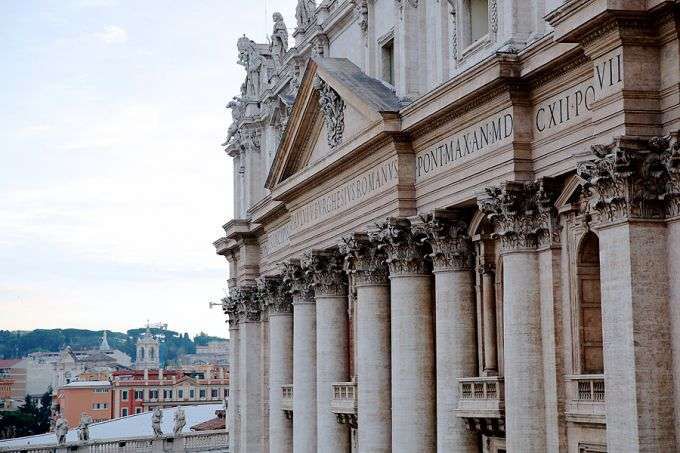Vatican City, Feb 15, 2017 / 08:01 am (CNA/EWTN News).- Pope Francis and his Council of Cardinals met for the 18th time this week to continue discussion on reforming the Roman Curia, focusing on how new bishops are chosen and the streamlining of several offices, including the Vatican tribunals.
According to a Feb. 15 Vatican communique, after opening their meetings with a declaration of support for Pope Francis and his reform efforts, the cardinals “have begun to examine the ‘Diaconia of Justice,’” and so dedicated a good chunk of this week’s meetings to the three Vatican tribunals. The tribunals are the Apostolic Penitentiary, the Supreme Tribunal of the Apostolic Signatura and the Tribunal of the Roman Rota.
In a nutshell, the Apostolic Penitentiary is the court in charge of cases involving excommunication and serious sins, including those whose absolution is reserved to the Holy See, while the Signatura, as it’s called, functions as a sort of Supreme Court. The Rota, for its part, is akin to a court of appeals or court of “last instance,” and is also where marriage annulment cases are judged.
In addition to the tribunals, the cardinals also dedicated a portion of the discussion to “the process for selecting candidates for the episcopate,” a topic that’s been on the table for some time. Each of the nine members of the council were present for the entirety of the Feb. 13-15 round of meetings, with the addition of Msgr. Dario Vigano, prefect of the Secretariat for Communications, who gave an update on his dicastery’s work.
In keeping with their custom, the cardinals concelebrated Mass with the Pope in the chapel of the Santa Marta guesthouse the first two days of the meeting. As usual, Pope Francis was present for the majority of the sessions apart from Monday morning, when he met the Costa Rican bishops in Rome for their ad limina visit, and Wednesday morning, during which he participated in the weekly general audience.
The cardinals, in addition to speaking about the tribunals and bishop selection, continued to discuss points brought up during the last round of meetings, including the possible restructuring of the Congregations for the Evangelization of Peoples (Propaganda Fides) and Oriental Churches and the Council for Interreligious Dialogue.
Cardinal Pell gave a presentation on work of Secretariat for the Economy and the continuing reform of Vatican finances, giving special emphasis to “the formation of personnel and human resources.” Msgr. Vigano offered his presentation on communications Monday afternoon, focusing at length on the consolidation of Vatican Radio and the Vatican Television Center.
It was noted in the Vatican communique that on this point, several meetings have already taken place with the Secretariat of State, the Secretariat for the Economy, the Administration of the Patrimony of the Holy See (APSA) and the Labor Office. Mention was also made of the plan to “restructure radio frequencies” and of a new policy for social how to handle social media. A brief reflection was also given on a project for reforming the Vatican Publishing House.
Before discussion began, however, the cardinals kicked off the first day of meetings by issuing a statement reaffirming their support for Pope Francis and his work after the pontiff received some harsh blowback for his reform in the days preceding the gathering. On Monday Cardinal Oscar Andrés Rodríguez Maradiaga greeted the Pope on behalf of the group at the start of their first session, thanking Francis for his Dec. 22 address to the Roman Curia and acknowledging “his encouragement and direction for the work of the council.”
“In relation to recent events, the Council of Cardinals expresses its full support of the work of the Pope, while ensuring full adhesion and support to his person and his Magisterium,” it added. The statement came out just over a week after posters criticizing the Pope were plastered on walls of the city center of Rome Feb. 4. Days later, a spoof of the Vatican newspaper L’Osservatore Romano was sent to cardinals and bishops in the Curia claiming the Pope had finally answered the five “dubia” submitted to him by four prelates in September, responding both “yes and no” to each.
In a Feb. 15 briefing with journalists on the winners of the International “Economy and Society” Prize of the Vatican’s Centesimus Annus Pro Pontifice foundation, Cardinal Reinhard Marx, president of the German bishops’ conference and a member of the Pope’s “Council of Nine,” spoke about the issue. When asked about the reason for issuing the statement, Marx said the intention was not to create a “great drama,” but rather to voice their support.
“It was time to repeat that we are supporting the Pope” and walking beside him, Marx said, adding that the statement seems to have been “well-accepted.” “We have discussion in the Church, normal discussions, tensions, it will always be like this,” he said, but explained that “at a time like this” when such vocal and public opposition has been voiced, “loyalty to the Pope is substantial.”
Established by Pope Francis shortly after his pontificate began in 2013, the council, also called “the Council of Nine,” serves as an advisory body on Church governance and reform, with special emphasis on the reform of Pastor Bonus, the 1988 apostolic constitution of St. John Paul II that regulates the competencies and work of the Roman Curia.
Keywords that have come out of the cardinals’ meetings so far and which have emerged as guiding principles for the ongoing Curial reform are harmonization, simplification, synodality and the Church’s “missionary drive.” The council of cardinals will conclude its last session Wednesday evening, and is set to meet again April 24-26 to continue discussion on moving forward in reforming curial structures.

